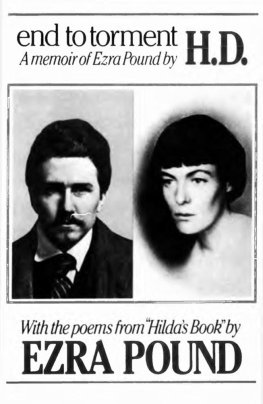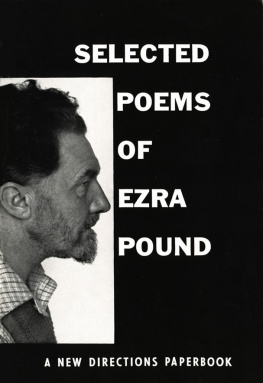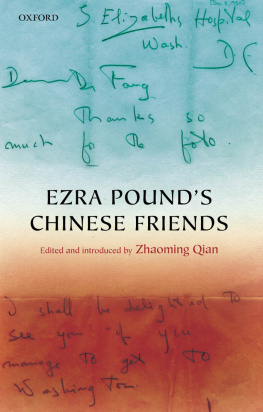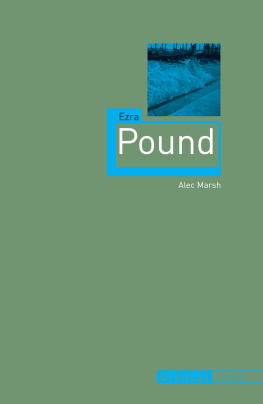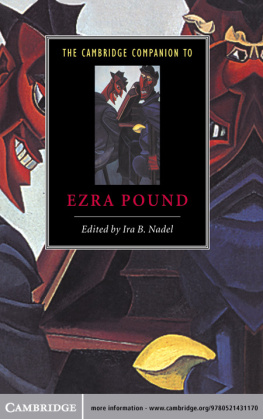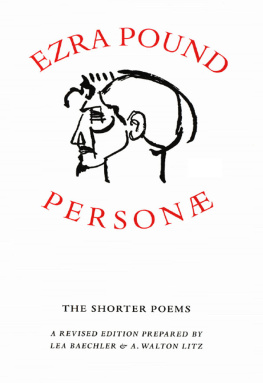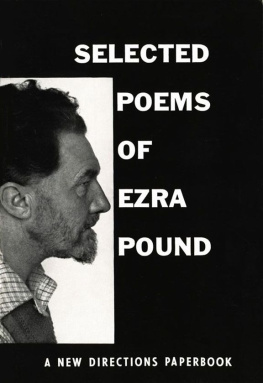Also by the author
NAKED ANGELS:
LIVES AND LITERATURE OF THE BEAT GENERATION
THE AMERICAN EXPERIENCE:
A RADICAL READER
Grateful acknowledgment is made to New Directions Publishing Corporation for permission to quote from previously unpublished material, or to quote extensively from the following published sources:
WORKS OF EZRA POUND:
Personae. Copyright 1926 by Ezra Pound.
Collected Early Poems. Copyright 1976 by the Trustees of the Ezra Pound Literary Property Trust.
The Cantos of Ezra Pound. Copyright 1934, 1937, 1940, 1948, 1956, 1959, 1962, 1963, 1966, 1968 by Ezra Pound.
Selected Prose. Copyright 1973 by the Estate of Ezra Pound.
The Literary Essays of Ezra Pound. Copyright 1935 by Ezra Pound.
Pavannes and Divigations. Copyright 1958 by Ezra Pound.
Ezra Pound and Dorothy Shakespear: Letters 19091914. Copyright 1976, 1984 by the Trustees of the Ezra Pound Literary Property Trust.
Selected Letters of Ezra Pound. Copyright 1950 by Ezra Pound.
Pound/James Joyce, Letters and Essays. Copyright 1967 by Ezra Pound.
Gaudier-Brzeska. Copyright 1970 by Ezra Pound. All Rights Reserved.
Jefferson and/or Mussolini. Copyright 1963 by Ezra Pound. Used by permission of Liveright Publishing Corporation.
Guide to Kulchur. Copyright 1970 by Ezra Pound. All Rights Reserved.
Excerpts from previously unpublished letters. Copyright 1986 by the Trustees of the Ezra Pound Literary Property Trust.
H.D., End to Torment. Copyright 1979 by New Directions Publishing Corporation.
A NCHOR P RESS
Published by Doubleday, a division of
Bantam Doubleday Dell Publishing Group, Inc.,
666 Fifth Avenue, New York, New York 10103
Anchor Press, Doubleday, and the portrayal of an anchor are
trademarks of Doubleday, a division of Bantam Doubleday
Dell Publishing Group, Inc.
Library of Congress Cataloging-in-Publication Data
Tytell, John.
Ezra Pound: the solitary volcano.
1. Pound, Ezra, 18851972Biography. 2. Poets,
American20th centuryBiography. I. Title.
PS3531.082Z8687 1987 811.52 [B] 86-25912
Copyright 1987 by John Tytell
eISBN: 978-0-307-83334-1
All Rights Reserved
v3.1
In memory of my parents, Lena and Charles
PREFACE
Ezra Pound detested the prospect of his own biography, resisting it as a sort of death announcement. Capable of intense adorations and great hatreds, Pound was the most controversial writer of our time. He was a man who did extreme things, a poet with enormous ambition, self-confidence, and pride, and a prophetic sense of message and mission. Some of his friends found him demented, others saw him as an actor playing a grand role for large stakes in the theater of history. In short, he was a man of complications with a compelling story.
Several years ago I visited James Laughlin, Pounds publisher, to inquire whether he thought there was room for another biography. Laughlin told me that none of the earlier attempts had successfully captured Pound, that there was a need for an interpretative biography that could explore the myths behind the man rather than merely debunking them. What he did not want to see was another behemoth biography, the nine-hundred-page loose and baggy monster in three volumes whose parade of facts would scatter like an army of ants in all directions.
Such an approach would contradict an essential part of Pounds own style, what he called his luminous methodthe selection of crucially revealing details presented in a honed and chiseled manner. This book was conceived in such a spirit, and with it I hope to illuminate the tragic circumstances surrounding Pounds poems. My book is based on the reading of thousands of unpublished letters, psychiatric reports, FBI files, and dozens of published personal accounts, and on interviews with people who knew Pound. It was written in Venice, Pounds first and last European love, the place where he published his first poems and spent his last years.
ACKNOWLEDGMENTS
For their support and suggestions, and for their reading of my manuscript, I would like to thank Leon Edel, Joyce Johnson, James Laughlin, Mellon Tytell, and Barry Wallenstein. I owe a special debt to my agent, Berenice Hoffman, and to my editors, Marshall De Bruhl, Janet Byrne, and Kathy Antrim. In Italy I was helped by Olga Rudge, Mary de Rachewiltz, Danieli Fona, Serge Perosa, and Fernanda Pivano. For assistance with my research, I am indebted to Robert Bertholf of the University of Buffalo, Cathy Henderson of the Humanities Research Center in Austin, Texas, Madeline Korey and David King of the Free Library of Philadelphia, Frank Lorentz of Hamilton College, David Schoonover of the Beinecke Collection at Yale, Dan Traister of the Van Pelt Library at the University of Pennsylvania, Saundra Taylor of the Lilly Library in Bloomington, Indiana, and Dr. Harold Thomas, Public Information Director of St. Elizabeths in Washington, D.C. I was helped by my colleagues Morris Dickstein, Virginia Hlvasa, Eddie Epstein, Jack Reilly, and Michael Timko, and also by Richard Ardinger, William French, Wayne Lawson, John Morris, Herb Payton, William Phillips, and Ronald Sukenick. The manuscript was typed by Grace Romeo and Janice Di Giovanni of the Word Processing Center at Queens College.
A BOUT THE A UTHOR
John Tytell was born in Antwerp, Belgium, in 1939, shortly before the Nazi invasion forced his family to flee the country. Raised in New York City, Mr. Tytell attended the Bronx High School of Science and the City College of New York. From 1961 to 1966, he worked as a Graduate Reader at New York University for Leon Edel and Oscar Cargill and completed his doctoral dissertation on Henry James. During this time, he also began teaching at Queens College, where he has been Professor of English since 1977.
Before finishing his doctorate, Mr. Tytell edited The American Experience: A Radical Reader, one of the earliest attempts to understand the 1960s. He is the author of Naked Angels: The Lives and Literature of the Beat Generation, the definitive account of the beats.
The Pound project began with an essay on fragmentation in modernism that Mr. Tytell wrote for the New York Literary Forum. After much encouragement he began research for an interpretative biography, reading some 15,000 letters by and to Pound. After completing his research, he went to Venice to write the book, living in a house five minutes from where Pound lived.
Mr. Tytell is executive editor of American Book Review, and is on the editorial board of Literature and Psychology and Psychological Review; his articles have been published in Vanity Fair, Studies in the Novel, The American Scholar, Partisan Review, Studies in the Twentieth Century, the New York Times, Soho News and Camera Arts. He is married and lives in Greenwich Village, New York City.
Life is terribly deficient in form. Its catastrophes happen in the wrong way and to the wrong people. There is a grotesque horror about its comedies, and its tragedies seem to culminate in farce.
Oscar Wilde
The Critic As Artist



